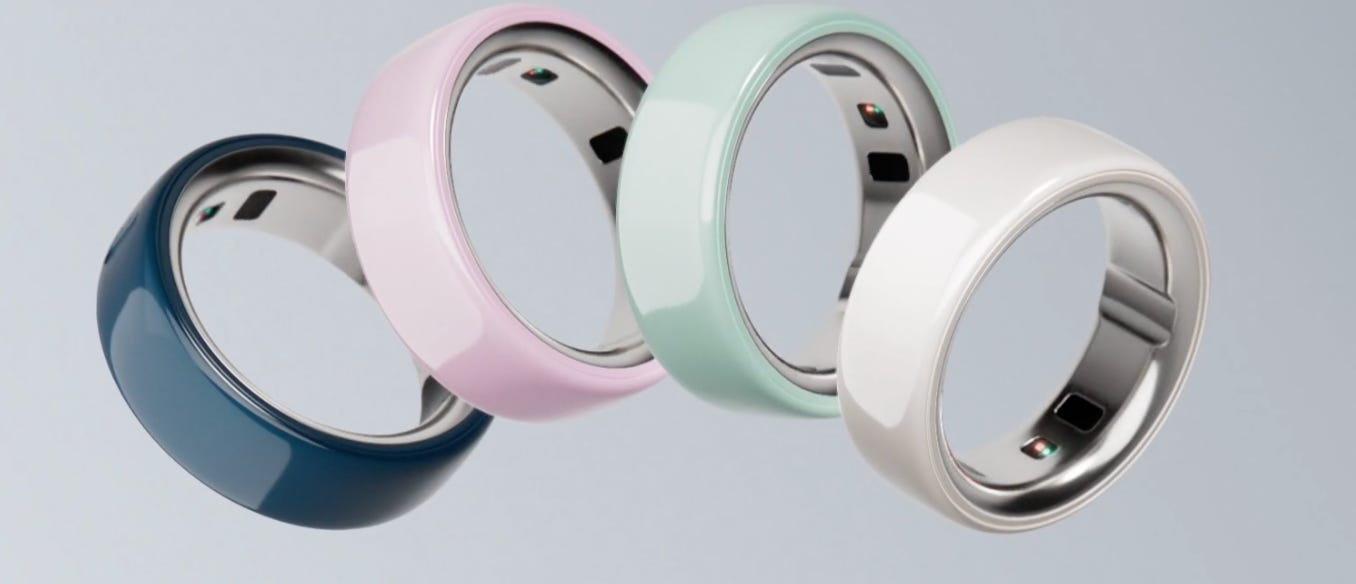💌 Issue 118: Autoimmune platform WellTheory raises $14 million | Natural Cycles launches first wearable | Unfabled's UK scale-up | Oura's unstoppable growth?
The global weekly briefing on women's health innovation and FemTech
Welcome to FutureFemHealth, (w/c October 12 2025) - we’re trusted by 8,700 investors, innovators and leaders to decode the funding flows, breakthrough ideas and policy shifts transforming the sector.
🌟 In this week’s briefing:
🚀 Oura ring is infrastructure for women’s health - and it’s just raised $900 million
❤️ Natural Cycles unveils its own wearable alongside new perimenopause mode
💰 Autoimmune care platform WellTheory raises $14 million Series A
📈 Unfabled begins UK-wide scale-up, raising $1.7m and expanding into 737 Boots stores
Got news to share from the world of FemTech and women’s health innovation? Let me know at anna@futurefemhealth.com
It’s time for FemTech to grow up

For a long time, ‘femtech’ really was synonymous with cycle tracking, ovulation prediction and fertility.
That’s changing.
There’s funding and focus beyond reproductive health. Case in point this week: WellTheory, an autoimmune-care platform that I’ve written about before, has raised its $14million Series A.
Autoimmune conditions disproportionately affect women - around 80 percent of patients - yet have long sat outside the women’s-health conversation. Now understanding is growing that women’s health is whole-body health.
Aging up
There’s also maturity within FemTech itself. As I trailed last week, Natural Cycles is aging with its users by launching NC° Perimenopause mode, powered by its new NC° Menopause Algorithm.
Founded in 2013, Natural Cycles made history as the first FDA-cleared digital contraceptive. Now, in a sea of misinformation and often a lack of reliable data around perimenopause, it’s taking a practical, evidence-based approach.
When I spoke with Magda Armbruster, the company’s Head of Product, she told me:
“There’s no single test that can confirm perimenopause… what we can do - and what the algorithm does - is track those changes continuously.”
Taking back the tech
Natural Cycles is also debuting its first hardware: the NC° Band, a sleep-only wearable that captures overnight temperature data, heart rate and movement, replacing the need for a manual thermometer and giving users an alternative to devices such as the Oura ring.
“NC° Band fills a key gap in our device lineup, supporting our mission and giving users more ways to measure,” explains Magda.
The timing couldn’t be more interesting. Just yesterday, ŌURA, maker of the Oura Ring, announced a $900 million raise.
Right now, Oura dominates in women’s health as the integration partner of choice. Its data on sleep, fertility, and recovery flow through to top women’s-health apps. It’s no overstatement to say Oura has become the somewhat invisible infrastructure of women’s health tech.
But that’s a powerful position for Oura (and other wearables such as Ultrahuman and Whoop) and it raises big, important questions about data, ownership and equity.
With the NC° Band launch, I wonder if we may be seeing the first signs of FemTech companies moving away from reliance on third-party ecosystems toward greater control over data, affordability, and user experience - even if a move into hardware isn’t an easy one.
Femtech is maturing - but this week shows there are big questions to grapple with, growing pains if you will.
And in a week that also sees the debut of two new headline events - Women’s Health Week Europe and Women’s Health Horizons (both starting today!) - the momentum in FemTech is hard to ignore.
💰 Capital flows: where are investors placing bets?
📌 U.S: How ŌURA’s $900M raise cements its quiet powerhouse role in women’s health tech. The smart ring maker - an integration partner for Clue, Natural Cycles, Maven Clinic and more - has become a somewhat unseen engine behind women’s health innovation. And since its 2015 debut, Oura has sold over 5.5 million rings, with more than half of those in the last year alone. This new round led by Fidelity Management & Research Company will allow ŌURA to invest in AI-driven product innovation, deeper global market reach and new features. (Continue reading: FutureFemHealth)
📌 US: WellTheory raises $14M Series A for whole-person autoimmune care. In just 18 months, WellTheory has raised $26.2M and secured significant partnerships with Fortune 100–500 employers, national insurers and payors. Outcomes data show reductions in ER visits, imaging, hospitalisations, and biologic use, generating thousands in annual savings per patient. This is a win for women’s health - around 80% of autoimmune patients are women, and when WellTheory launched its dedicated women’s health program in December 2024, it revealed that women made up 71% of all its patients. (Continue reading: FutureFemHealth)
📌 UK: Unfabled begins UK-wide scale-up, raising $1.7m and expanding into 737 Boots stores. Less than a year after testing six products in 50 Boots stores, Unfabled is now expanding to 737 locations, backed by $1.7M in new funding from Arāya Ventures. What began as a marketplace for women’s wellness brands in 2021 has evolved into a full-fledged product company built from community feedback. Unfabled listened to what women actually needed - from bloating relief to better sleep - and designed its own line of supplements and wellness products guided by consumer insights through Unfabled Labs. The speed of this rollout shows the power of community-led innovation. (Continue reading: FutureFemHealth)
📌 GLOBAL: 13 female celebrities investing in women’s health. There’s a clear trend of female stars choosing to help close the gender health gap. Bringing attention as well as funding means an added boost for startups. This piece profiles how celebrities from Emma Watson to Oprah Winfrey are investing in companies focused on behavioral health, hormone health, telehealth and more. (Continue reading: The Flow Space)
This week’s poll
Last week’s poll asked ‘is your career in women’s health more or less stressful than roles in other industries’? Nearly half of you (47%) said it’s more stressful, while 26% said it’s about the same and 21% of you said it’s less stressful.
👩🏽💻 Do you have a juicy question we could ask our readers? Let me know at anna@futurefemhealth.com!
🌟 Industry moves and strategic shifts

📌 GLOBAL: The team behind Women’s Health Horizons wants to shake up how women’s health gets funded and discussed. After witnessing his mother’s years-long struggle with misdiagnosis, consultant-turned-founder Jason Clark set out to build a platform that actually connects the dots between policy, research, and innovation. Women’s Health Horizons (WHH) now launches its first flagship conference in Boston today - backed by HSBC Innovation Banking and an advisory board spanning pharma veterans to patient advocates. Global events - including London next March are to follow. Co-founder Ashleigh Niziol says the aim isn’t just more conversation but more action: from funders, corporates, and even men in leadership who’ve long sat out this space. (Continue reading: FutureFemHealth [partner content])
📌 U.S: Wisp partners with Vesalius to bring peptide longevity therapies to women. “Women have been an afterthought in the longevity space” shares Wisp CEO Monica Cepak. The women’s telehealth provider is teaming up with Vesalius Longevity Labs to co-develop peptide-based therapeutics aimed at metabolism, hormone balance, and healthy aging. The partnership marks Wisp’s entry into the longevity market - expanding a field that has so far focused largely on men. (Continue reading: FutureFemHealth)
📌 SWEDEN: Natural Cycles launches NC° Perimenopause mode and its first wearable, the NC° Band. As we trailed above (and last week!) the app that became the first FDA-cleared digital contraceptive has now extended its evidence-based model into perimenopause with a new NC° Menopause Algorithm. And, it’s debuting its own temperature-tracking wearable, the NC° Band. The launches signal both a broadening into midlife health and a step towards hardware independence in a wearable market long dominated by Oura integrations. (Continue reading: FutureFemHealth)
📌 UK: New app Nexus connects fitness, nutrition and cycle tracking through AI-powered health companion. Healthtech for women mostly exists in isolated verticals - with users typically downloading several apps to get what they need. Nexus, built around a proprietary AI and in-app AI health coach, wants to connect it all together into adaptive, evidence-based guidance. The apps onboarding process for example, offers over 50,000 unique combinations of personalised insights. (Continue reading: FutureFemHealth)
📌 U.S: Women’s metabolic health provider Allara Health goes national. Women’s metabolic care startup Allara Health is now available in all 50 states, marking a rapid jump from 30 at the year’s start, after its January $26m Series B. The platform, which focuses on hormonal, metabolic and reproductive conditions, also released a 2025 outcomes report showing demonstrated improvements in patient health. With both reach and validated outcomes Allara is now positioned for further success. (Continue reading: Fierce Healthcare)
📌 GLOBAL: How strategic partnerships are solving Femtech’s biggest growth challenges. As a route to scale amid funding and censorship challenges, strategic partnerships in women’s health are helping startups to grow and demonstrate clinical value. Pharma, health systems, big tech and aligned beauty, sports and consumer brands are emerging as four popular pathways. (Continue reading: Forbes)
🩸 Research and women’s health news
📌 GLOBAL: The silent ban: how social media is censoring women’s health. Imagine building a company to tackle endometriosis or pelvic pain and your posts on social media get banned or removed because it talks about women’s bodies. That’s a reality for many women’s health companies today. I joined Maryann Selfe on the Blindspot Capital podcast to explain more about our work on CensHERship and how we’re tackling this systemic barrier. (Continue reading: FemmeHealth Ventures)
📌 UK: Female athletes have faster reaction times on day they ovulate, study finds. Female athletes react 80 milliseconds faster and make fewer mistakes on the day they ovulate according to a small study from University College London. Researchers say this could make a big difference at elite level but for the broader population the difference could also determine whether we regain balance after tripping over an obstacle or not. “We already knew being active can build bone strength and now we know being active can increase our response times. This report adds a second layer of urgency to get women active and address the tragedy and cost of fragility fractures,” said Women in Sport Chief Executive Stephanie Hilborne. (Continue reading: The Guardian)
📌 U.S: $3.7M study to probe perimenopause’s link to psychosis. Michigan State researchers will follow 750 women through perimenopause, using daily hormone tracking to test whether fluctuations drive psychosis risk. If successful, the research could reshape how we screen, support, and treat women in midlife. (Continue reading: Michigan State University)
📌 GLOBAL: Transforming women’s health through innovation. Funded by Gates Foundation, the British Medical Journal (BMJ) has released a special open access and female-authored collection about innovation in women’s health. Articles cover ethics, data-driven approaches, regulatory safeguards and more. (Continue reading: BMJ)
📄 Policy watch: risks and opportunities
📌 U.S: Women’s health should be a bipartisan priority. In the midst of a Government shutdown, journalist and advocate Maria Shriver argues that women’s health is not just a women’s issue but a national health issue and philanthropy cannot solve the problem alone. (Continue reading: Time)
✅ Hiring now
📌 UK: Women’s female athlete health delivery lead, The Football Association
📌 UK: Clinical Product Manager, Hertility
That’s all for this week! If you’ve missed any previous newsletter issues catch them all at futurefemhealth.com and do make sure to follow us on LinkedIn.
Anna
PS. FutureFemHealth reaches nearly 8,700 decision-makers and professionals in women’s health each week - from investors and founders to healthcare leaders and corporates. To explore partnership opportunities or request our media pack contact: anna@futurefemhealth.com





